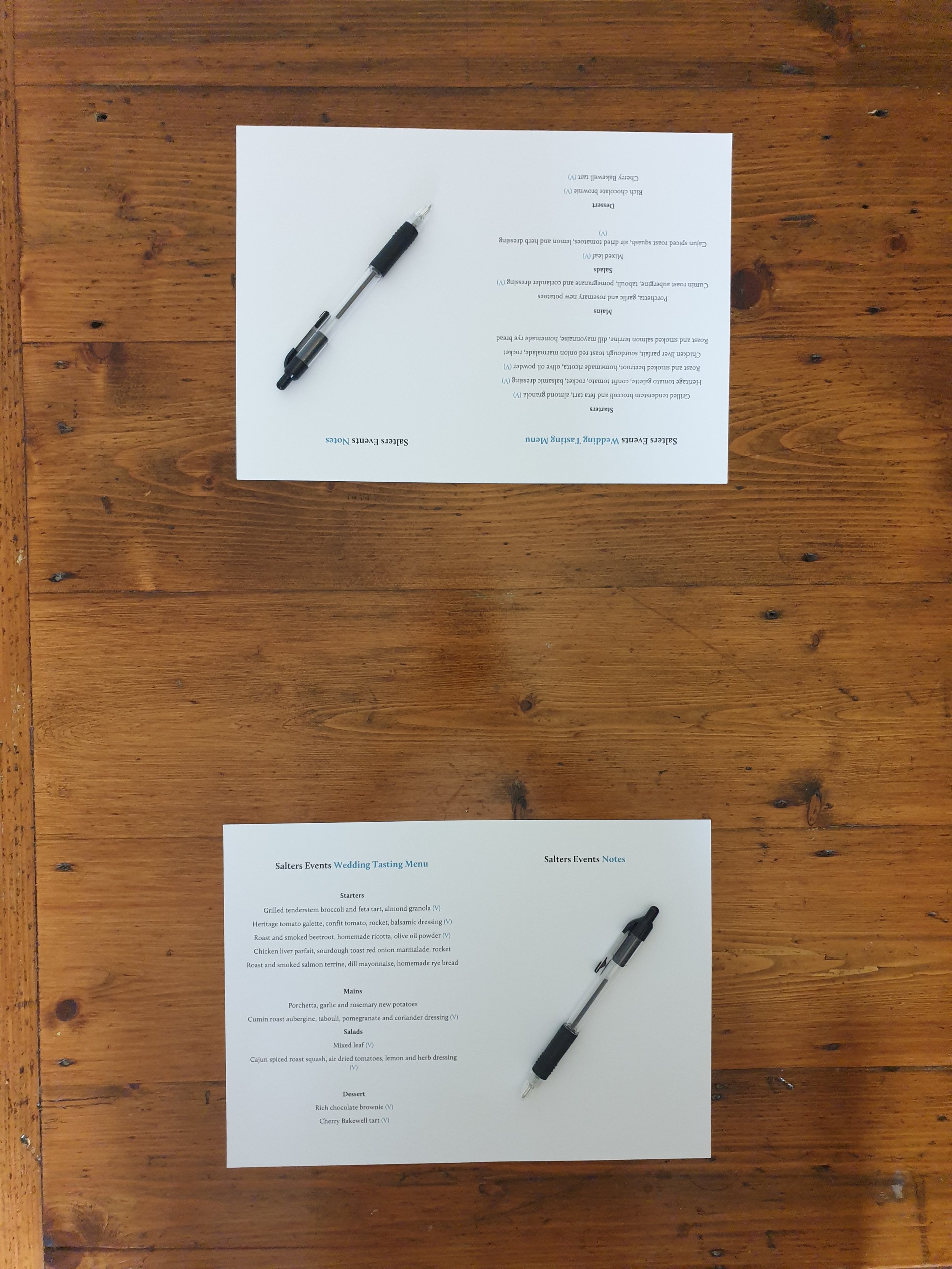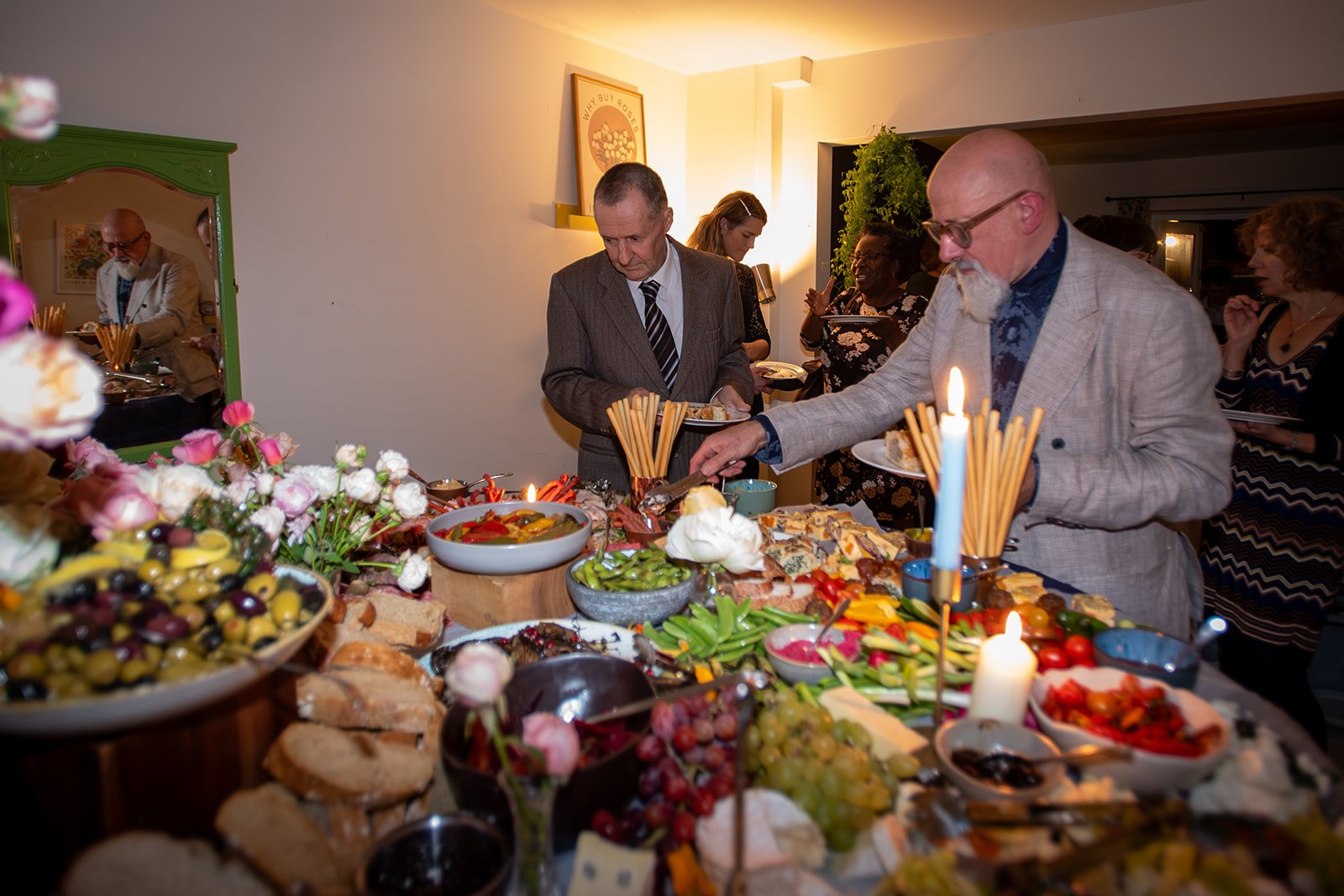Everything You Need to Know About Your Wedding Food Tasting
Everything You Need to Know About Your Wedding Food Tasting
Whatever you do, don't forget to take notes!
You've been working through your pre-wedding checklist and now it’s time for one of the fun parts of the planning process: the wedding food tasting. For many couples, food is one of the most important, memorable parts of the whole wedding, but what happens at a tasting and how do you prepare for it?
A wedding food tasting is exactly what it sounds like: It's a time for you and your soon-to-be spouse to taste a variety of different menu options with your caterer. In general, you'll try a variety of different canapes, starters, mains, and possibly even desserts. The tasting typically takes months before the big day to allow plenty of time for any adjustments or changes to the final menu. If you haven’t selected a caterer yet, this might help you make your decision. If you have already signed a contract with one, this gives you the chance to get to know their presentation style and taste their food.
Do You Need to Have a Wedding Food Tasting?
No. A wedding food tasting isn’t absolutely essential, particularly if you have had the caterer/chef’s food at other weddings or events and loved it. Similarly, if you trust the recommendations of people you know who have used this caterer in the past and you don’t feel a tasting session is necessary, it's entirely fine to skip it. “We actually have some clients that never do a tasting and they are spending five figures on their catering,” says Ian. However, a tasting is helpful to make sure that your vision matches the caterer’s vision, and they understand exactly what you want so there are no big surprises on your special day. It’s a great opportunity to work out any of the kinks ahead of time.
What to Expect at a Wedding Food Tasting
Wedding food tastings can vary quite a bit by venue and caterer. For example, if you are using a wedding venue where everything is in-house (which is typically the more budget-friendly option), your tasting might be in a big ballroom with 100 other couples and a big buffet featuring all the menu items you are able to select from. Alternatively, if it’s more of a personalized experience, the caterer will typically create the whole wedding menu, including canapes, dinner, and sometimes dessert, for your tasting. “Our menus are entirely custom,” says Ian. “We procure all the ingredients and produce and create a full, unique wedding menu for each couples’ tastings.”
Your caterer will walk you through each course and you will taste each dish, and they will also ask you and your significant other for feedback. Don’t forget to take notes on the menu and even take a quick picture of it so when you are going through final menu selections later (oftentimes, many months after), you have good records to refer back to.
Keep in mind that if any of the dishes on your menu feature a main ingredient that is quite seasonal (and presumably your tasting isn’t in the same season your wedding is taking place), your caterer might not serve that specific dish at the tasting. “If the ingredient is available, but perhaps not at its peak, we will often still use it so you can get a sense of the dish,” says Ian. “But if the dish calls for an heirloom tomato in August and it’s January, we will skip it.”
If you have not booked with your caterer yet, they will typically charge you for the tasting (from £200 for two people). If you are in contract with them already, some will waive all or most of the tasting charge.
How to Prepare for Your Wedding Food Tasting
Know Your Overall Budget
If you haven’t discussed a budget with your caterer yet, you should come prepared and ready to discuss what you’re envisioning so you can be sure that you are aligned in terms of the numbers. If you need to find ways to make cuts, talk about certain items that you are really excited about (maybe the two of you are obsessed with cacio e pepe and you really want to make sure it’s incorporated) and then eliminate some of the extra menu items that might be adding to the cost.
Come Prepared With Food Preferences and Inspiration
Your caterer will want to review your food likes/dislikes (while keeping your guests in mind as well), cuisine preferences, certain dishes that are special to the two of you as a couple, any allergies/dietary restrictions, favourite restaurants, etc. before they share a proposed menu with you for the tasting. Answering these questions will help you hone in what’s most important to you (food wise) for the big day.
Once they send you the proposed menu before the tasting, make sure to take time to carefully review it and make any changes right away to give their team plenty of time to adjust. “We try to narrow the menu down to your top selections before the tasting,” says Ian. “Some people want to taste a huge variety, and we're happy to try and accommodate that but we will likely charge more in that case.”
Think About the Food at Other Wedding Weekend Events
Make sure to consider your other wedding weekend events and the food you will be serving at them. If your dinner the night before is going to be a family-style pizza party, you might want to avoid doing pizzas at your reception. You want to add in variety, both in food and service style, so think about the big picture of the whole wedding weekend rather than just your big day.
Questions to Ask Your Caterer
Who is preparing the tasting today?
“It’s one of the most important things to ask at a tasting,” advises Ian. “Basically, a company might have one really skilled chef who is doing all the tastings, but they’re not cooking at the actual event and that makes your tasting a bit pointless.”
How far is the kitchen from where my guests will be dining?
Unless you work in food and events, this might not be so obvious but it’s important to review the behind-the-scenes logistics with your caterer. “Some food just won’t hold up as well as other menu items, so that's something else you need to know if you have to design it to be room temperature,” says Ian. You also have to factor in the weather. “If it’s going to be in a cold setting, the food will obviously get cold much quicker,” he says.
How do you handle dietary restrictions and allergies?
“We just asked to be notified of any dietary restrictions/allergies before the event,” says Ian. “The more notice we have, the better we can prepare. You are off-site, so you are limited to the ingredients that you have on hand. But we're more than happy to accommodate them.”
Some additional questions you might want to address include:
Can we meet our on-site coordinator on the day of the tasting or before the wedding?
Can we see photos of the food and presentation from some of your past weddings?
How many weddings do you typically do in a year?
Do you provide linens and napkins? What are the costs associated with that?
If not, can you handle coordinating those rentals?
What is the server to guest ratio?
Will all the food be made on-site or prepared in advance and brought in?
Does our venue have enough kitchen space for you to execute our menu?
How will your staff balance multiple events on the same day?
Where do you source your food from?
How will everything be plated, portioned, and presented on the day of the event?
Do you also do wedding cakes? What other desserts do you do?
When do you need final menu choices and headcount?
Can you provide the vendor meals?
Do you provide bartending services?
What is your cancellation policy?
Wedding Tasting Etiquette
Don’t Show Up With Your Whole Extended Family
Typically, a tasting will include two people, but you should confirm this with your caterer ahead of time. If you would like to have more than two people, ask them if this is possible and what the additional fee will be.
Be on Time
If you have another tasting scheduled after, make sure to let the caterers know of your time constraints so they can plan accordingly.
If you’re doing multiple tastings in a day, wear clothes that are forgiving and eat light in the time leading up to the tasting. Tastings often include a lot of eating, and you don’t want to be uncomfortable or unable to eat at the second tasting because you ate too much at the first one.
Offer Constructive Feedback
If you like the elements of the dish but perhaps there’s one thing you want to be changed or removed, don’t eliminate it entirely. Instead, tell them exactly what you like and don’t like so they can adjust it.
Whatever you decide, Salters Events is here to guide you through the process. Get in touch hello@saltersevents.co.uk





